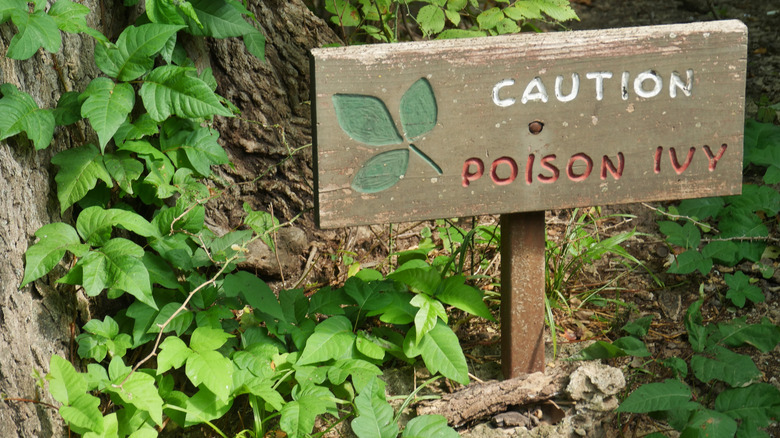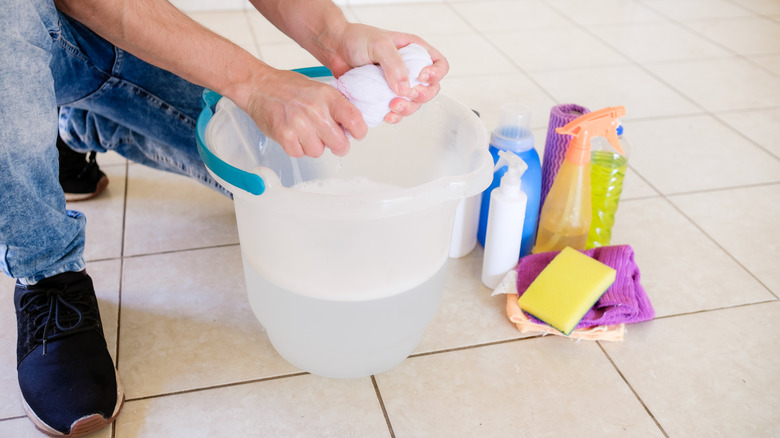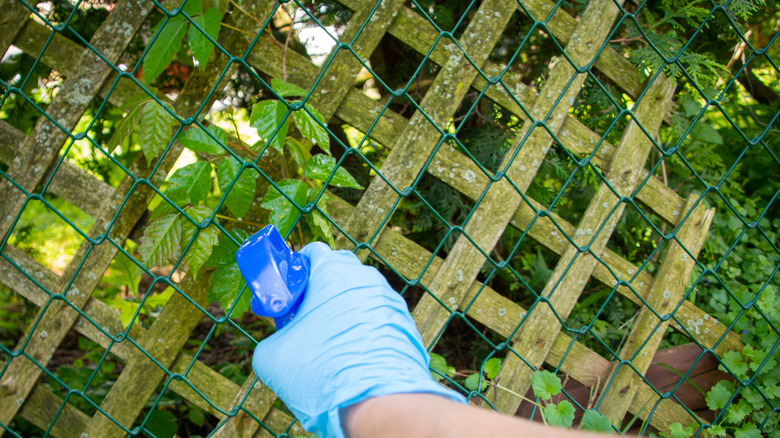Think Twice Before Mixing These Household Items To Knock Out Poison Ivy
Mixing hydrogen peroxide and bleach to kill poison ivy is not a good idea due to the potential chemical reaction that can occur and the associated dangers. While they can effectively kill certain organisms, their combination can lead to a dangerous reaction. This reaction generates heat and produces various byproducts, including chlorine gas and water, the former of which is extremely dangerous.
Chlorine gas is highly toxic and can cause severe respiratory problems, eye irritation, and even lung damage. Inhaling chlorine gas can be particularly dangerous, especially in enclosed spaces or without proper ventilation. Furthermore, the combination of hydrogen peroxide and bleach can also lead to the formation of other harmful compounds, such as peracetic acid. Peracetic acid is a corrosive substance that can cause skin burns, eye damage, and respiratory irritation. Another danger associated with mixing bleach and hydrogen peroxide is potentially creating oxygen gas, which can lead to a deadly combustion. Even without an explosion, the combination of these two cleaning agents releases heat, which can lead to burns if handled improperly. Therefore, it's essential to avoid mixing these chemicals.
To safely and effectively kill poison ivy, it is recommended to use alternative methods. One option is to use herbicides specifically designed for poison ivy control. These herbicides are formulated to target the plant without posing significant risks to humans or the environment, but you should still check the labels for any cautions or hazards.
What to do if you have accidentally mixed these chemicals
If you accidentally mix hydrogen peroxide and bleach, immediately evacuate the area to get fresh air and avoid inhaling the toxic fumes or handling the hot liquids. Open windows and doors to ventilate the space. Call emergency services to summon help, particularly in the event or risk of a fire. If you're exposed, seek medical attention promptly and inform healthcare professionals about the chemicals involved. Do not attempt to self-diagnose or treat symptoms. Rinse any affected skin or eyes with copious amounts of water for at least 15 minutes. If ingested, do not induce vomiting. Instead, seek medical assistance immediately or call poison control at 1-800-222-1222. Always wear protective equipment, such as gloves and goggles, when handling these chemicals to minimize the risk of accidental exposure to your skin or eyes.
To safely dispose of unmixed hydrogen peroxide and bleach, it is crucial to separate and dilute them. Pour each chemical into a separate container, preferably made of a compatible material, and dilute them with water. Once diluted, these solutions can be flushed down the drain with water. Ensure that the drain is connected to a municipal wastewater treatment system to further neutralize the chemicals. Do not mix the two chemicals directly, even during disposal. Alternatively, contact your local hazardous waste disposal facility for guidance on proper disposal methods if dilution and flushing are not suitable. Always follow local regulations and guidelines for the safe disposal of hazardous materials.
Safer ways to kill poison ivy
Household chemicals that can safely kill poison ivy include items such as vinegar, salt, and dish soap. These substances can effectively eliminate poison ivy without resorting to toxic commercial chemicals. Vinegar is a common household item that can kill poison ivy. Its acetic acid content acts as a natural herbicide, causing the plant to wither. Mix a solution of vinegar with water and a few drops of dish soap to enhance its effectiveness. Apply the mixture directly to the leaves and stems of the poison ivy, ensuring thorough coverage. Be cautious not to spray nearby plants, as vinegar can be non-selective and harm other vegetation.
Salt is another household item that can kill poison ivy. When salt is applied to the soil around the plant, it dehydrates the roots, effectively inhibiting the plant's growth. Dissolve salt in vinegar to elevate its effectiveness and pour it around the base of the poison ivy plant. Keep in mind that using salt excessively can harm the soil and other plants, so it's essential to apply it judiciously.
Dish soap can be combined with both vinegar and salt solutions to increase their effectiveness. The soap acts as a surfactant, helping the solutions adhere to the poison ivy leaves. Mix dish soap with vinegar or salt solutions as directed and spray or pour the mixture onto the poison ivy. Remember to wear protective clothing, including gloves and long sleeves, to avoid contact with the plant's oils.


